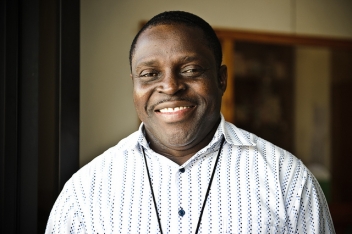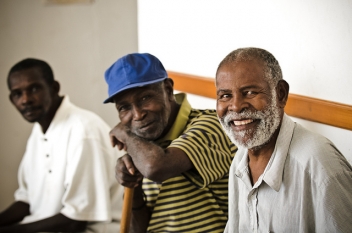 On the first anniversary of the Haiti earthquake, Doctor Ersno Casimir (pictured)who works in CENSHOP hospital in Port-au-Prince looks back over the past 12 months and tells us how working with HelpAge has improved things for older people in the hospital:
On the first anniversary of the Haiti earthquake, Doctor Ersno Casimir (pictured)who works in CENSHOP hospital in Port-au-Prince looks back over the past 12 months and tells us how working with HelpAge has improved things for older people in the hospital:
“HelpAge is the first organisation to do this kind of work in Haiti. It’s not easy work; the older people are very vulnerable and they need a lot of care and attention.
“Now older people can stay here”
“Before HelpAge came here, we had three basic services: internal medicine, paediatrics and gynaecology. Through the internal medicine services we saw some older people but we could only treat them daily. We had nowhere for them to stay and get treated long term.
“Now, because of the new ward, older people can stay here. The home based carers (a volunteer scheme set up by HelpAge) can also identify people in camps and bring them here.
“Before the ward, older people used to have to pay for treatment but now it is all free.
Hope for the future
 “I really hope the partnership between CENSHOP and HelpAge will continue for a long time so we can continue to offer this kind of care.
“I really hope the partnership between CENSHOP and HelpAge will continue for a long time so we can continue to offer this kind of care.
“My hopes for the coming years are that doctors from overseas come here to Haiti to share their experiences and knowledge with us.
“There is also a space behind the ward where I would like to build a dormitory so that older people who come here from the camps for a shorter treatment can be treated and then stay a few nights until they are properly stabilised.
“We need more staff and it would be great if we could get better equipment such as bone scanners and an MRI scanner. Older people’s bones break easily and very often they have heart problems so if we had equipment like this we could detect it earlier.
“At the moment, these jobs are done by mobile equipment which is brought into the hospital temporarily.”
Residents are fed and cared for
The HelpAge geriatric unit at CENSHOP public hospital was set up in April 2010, four months after the January earthquake.
Since then it has seen 2,000 older people. Most have come for one or two days of treatment but the unit also has a ward that can house up to 35 longer-term residents.
Residents are fed, cared for, treated and sometimes taken to church. They may also be referred to larger hospitals if necessary if they need an operation. The ward is run by four doctors and four nurses specially trained in geriatric care by HelpAge.
Emotional and physical health are important
The ward also provides psycho-social activities such as games and dancing to take the residents’ mind off things and de-stress them.
Nurses from CENSHOP were given two weeks of training, provided by HelpAge in partnership with IPESI. The course was called “Overall support for the elderly”. Fifteen speakers, including physicians, psychologists and nurses, spoke to 30 nurses on various themes such as how to handle older people physically when bathing them, methods for managing stress, aggression, depression, separation and grief, psychosocial problems, hospital hygiene, team work and relationships.
To find out more about our work in Haiti since the earthquake, watch our audio slideshow:
Read more about “Healing Haiti after the earthquake”
